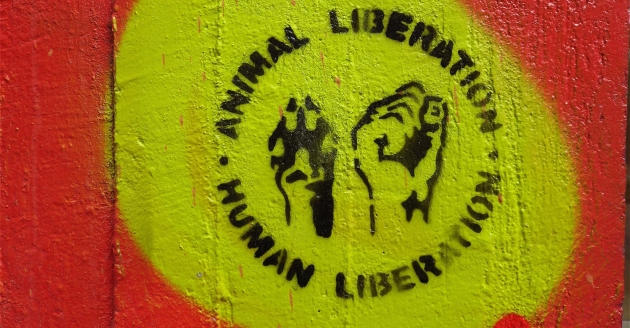When I walk by these lights in New Cross, I think about the type of person I want to be. I imagine a brave and beautiful woman: a red-haired Celtic warrior, ready to stand up for herself, and for others, when it matters. To show solidarity for animals, vegans choose to step outside the social norms that cause animals harm and boycott the industries involved in their exploitation, but does a similar mindset frame our choices where human exploitation is concerned? And if not, are we not then denying humans the same considerations we afford to animals? Does it even matter, anyway?
I’ve participated at enough vegan-led events to see the slogan “Animal Liberation • Human Liberation” faithfully woven into campaign manifestos and sewn onto flags, and while I don’t doubt the sentiment, at times I’m not wholly convinced of our ability to achieve it—and I leave feeling disheartened and empty. Perhaps this is more a sober recognition of the part I’ve played in side-stepping issues around human exploitation, or maybe it’s a manifestation of my wavering belief in the vegan movement alone to challenge the societal values that commodify life, and the institutions that gamble with it.
Take the world’s largest coporation, for example (1).
Apple’s commitment to human rights has come under fire amidst allegations of exploitative working conditions at its supplier factories in China (2,3). The poetry of former Foxconn employee, Xu Lizhi (1990-2014), provides a glimpse of what life is like for workers on iPhone assembly lines at the factory’s facilities in Shenzhen, China. Problems linked to suppliers in Indonesia have also surfaced, with reports claiming that tin used to manufacture iPhones is being sourced from unregulated mines rife with dangerous working conditions, child labour, habitat destruction and environmental pollution (4).
While conditions such as these are not atypical within the electronics industry, senior Apple representatives insist the company is doing more than its rivals “to ensure fair and safe working conditions” (5). To further the perception of the company’s ‘corporate conscience’ and its commitment to sustainability, Tim Cook (CEO) launched Apple’s “Better” campaign on Earth Day in April, 2014. Manufactured in Silicon Valley, California, this brave new world seems light years away from the daily reality of factory life experienced by workers further down Apple’s supply chain—and Xu’s story is testament to how easily the most vulnerable individuals are lost, or become invisible, in a system that safeguards profit over people. If Tim Cook’s shoulders feel heavy, however, I don’t think he is solely to blame. (I know I can’t claim immunity as I sit here typing on my Apple Mac…)
Xu Lizhi 许立志
So what’s this got to do with veganism?
The Apple case (and Xu’s story in particular) has led me to question whether we’re justified in flying the cruelty-free flag of veganism if we financially support, or remain silent about, companies or industries that we know contribute to the harm of others—beyond our dinner plates. At the risk of getting tied up in ethical knots over every single thing we do, this raises the thorny question of what it really means to be vegan: is it enough to remove animal products from our lives and to shop ‘cruelty-free’, or is veganism something more than a zeitgeist consumer lifestyle with health benefits?
Rethinking veganism in this way does not mean losing sight of the billions of animals exploited on farms, locked in labs or caged in circuses and zoos, but it does mean examining how our own attitudes and behaviour affect individuals other than animals and questioning whether we’re committed to standing up against all forms of oppression and violence. If we say veganism is “for the benefit of people also”, then it’s incumbent on us to consider our footprint beyond the lives of animals and understand how our work intersects with other social justice causes; whether we’re helping or hindering. Otherwise, we run the risk of losing credibility as a legitimate movement, being dismissed as a disconnected social club or, worse still, tokenizing issues such as workers’ rights and environmental sustainability for our own agenda, with manifestos that amount to little more than empty rhetoric—in a similar vein to Apple.
Recognising the shortcomings in our movement starts with recognising those in ourselves and realising that being vegan is a means, not an end. We don’t lay sole claim on trying to create a ‘better’ world: whether it’s childbirth (Suzanne Arms), chocolate (Lauren Ornelas) or corporate finance (Brett Scott), there are lion-hearted individuals far beyond our movement working hard to shake the structures of society that prop up and perpetuate unjust divisions and exploitative relations between us. Despite differences in our thinking about animals, recognising the good in other social movements can provide a starting point for opening up conversations about potential ways of working together in our capacities as activists, artists, educators, citizens, community workers or political campaigners, toward a shared goal of cultivating a non-violent world, where everyone is counted and everyone is loved. In his message about standing up to injustice, Henry David Thoreau said, “For it matters not how small the beginning may seem to be: what is once well done is done forever” (6). The challenge, as I see it, is to face those conversations and new beginnings with grace, with guts, and with our eyes wide open.
References:
1. Based on FT Global 500 2014 rankings. http://www.ft.com/cms/s/0/988051be-fdee-11e3-bd0e-00144feab7de.html#axzz3Y3IaMUYE
2. China Labor Watch. 2012. Beyond Foxconn: Deplorable Working Conditions Characterize Apple’s Entire Supply Chain. http://www.chinalaborwatch.org/upfile/2012_8_13/2012627-5.pdf
3. Students and Scholars Against Corporate Misbehaviour. 2010. Workers as Machines: Military Management in Foxconn. http://sacom.hk/wp-content/uploads/2010/11/report-on-foxconn-workers-as-machines_sacom.pdf
4. Friends of the Earth. 2012. Mining for smartphones: the true cost of tin. http://www.foe.co.uk/sites/default/files/downloads/tin_mining.pdf
5. Williams, Rhiannon. 2014. Apple’s letter to UK staff over Chinese factory conditions. http://www.telegraph.co.uk/technology/apple/11303406/Read-Apples-letter-to-UK-staff-over-Chinese-factory-conditions.html
6. Thoreau, Henry David. 1849. Civil Disobedience. http://xroads.virginia.edu/~hyper2/thoreau/civil.html
Image credits:
Hannah Nicklin; The Sparrow Project; London Review of Books.



